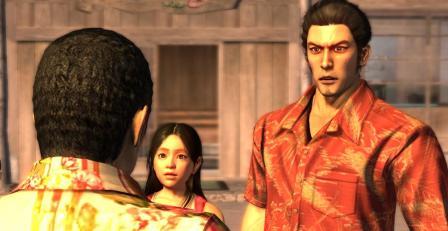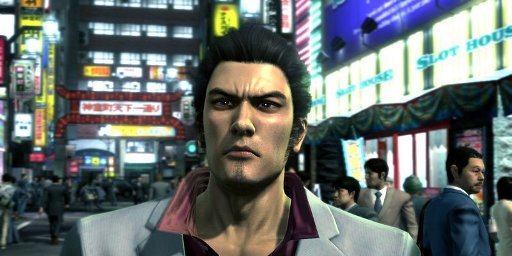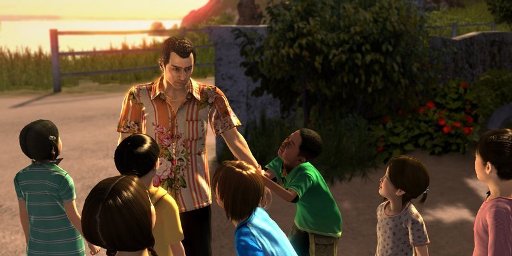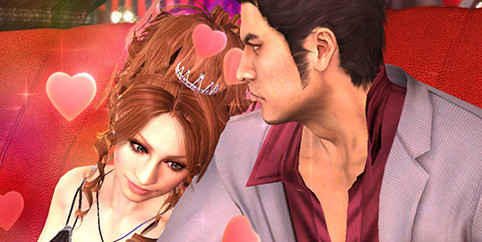October 29th, 2010
My Life as a Gangster-turned-Orphanage Director

Don’t Tell Mom The Babysitter’s Dead 2: Okinawa Drift
Note: I know this is very, very, very old news, but I was looking at some rough drafts of unfinished posts I’d started awhile back and figured I’d put my two cents in about the game anyway, as it’s Asia-related and even spawned a feature film directed by Takashi Miike.
Yakuza 3 — aka Ryu ka gokuto 3/Like a Dragon 3 — came out on American shores on March 9, 2010. Rather than purchase God of War III or Heavy Rain, two well-reviewed games which were both released around the same time, I decided to plunk my hard-earned money down for the third installment in Sega’s “popular only in Japan” gangster series. Why?
Well, I became a fan of the franchise when I bought Yakuza 2 for the PS2 based on positive word of mouth. I ended up loving it, as its addictive gameplay provided a welcome respite from the doldrums of preparing for my PhD qualifying exams. After I completed the game and passed my exams, I searched out and found a used copy of the original game at a local Gamestop. Featuring a “name” English voice cast that includes Mark Hamill, Michael Madsen, Rachael Leigh Cook, Eliza Dushku, Dwight “Howling Mad Murdock” Schultz, and Alan Dale (LOST’s Charles Widmore), the game is quite good as well, although the controls are predictably less advanced than its predecessor. It also didn’t help that the plot of the entire game was already spoiled for me by very cool cutscene “movie” available in Yakuza 2 that provides all the relevant backstory. My enthusiasm for the series even motivated me to track down the Takashi Miike movie Like a Dragon, which adapts the events of the first game with, I’m sorry to say, very mixed results.
For the premise of the game, I turn to the official product description:
Yakuza 3 is the next cinematic chapter in the prestigious video game saga offering an authentic, gritty and often violent story set in modern day Japan. Following the events of the previous game, Kazuma and Haruka (his adopted daughter) have left Kamurochoto to seek a new life in Okinawa where they manage an orphanage for children. However, their peaceful life is soon interrupted when a series of events unfold pulling Kazuma back into the shadowy past he thought he had left behind. Making its first appearance exclusively on the PlayStation 3 platform, the rich story and vibrant world of Yakuza 3 lets players engage in intense brutal clashes within the streets of Okinawa, and the pulsating and often dangerous city of Tokyo where only the strongest will survive.
In my opinion, the game has a lot of problems, some are quibbles that I think any fan of the franchise would have, while others are issues that I think would be apparent to players who’ve never picked up any of the other games in the series.
Problem 1: The Hero

I don’t think I’m alone in wondering if the series needs a new protagonist. There’s absolutely no mystery to the character of Kiryu Kazuma anymore. He’s an honorable ex-Yakuza, who would never do the wrong thing and wants nothing more than to be a family man. There’s nothing wrong with that premise per se, but when you put him in the cutthroat world of Yakuza 3, it doesn’t quite work anymore.
Problem 2: The Orphanage

The game designers seem to think that being a foster father to a bunch of orphans is actually fun. I don’t mind a handful of side missions that force you to deal with the problems facing these various children — form bullying to first love to racial issues — but when it feels like more than fifty percent of your time is spent dealing with petty domestic issues rather than busting some corrupt Yakuza heads, the whole thing can get a bit tedious.
Problem 3: The Story
What’s sad about Yakuza 3 — the first game to jump to the PlayStation 3 console — is that the storyline is neither as compelling as the first game nor as deep and twisty as the second one. The whole U.S. army/Yakuza/Japanese politician land grab involving local Okinawa residents being forced out of their homes had a lot of potential, but in terms of execution the whole thing sort of fell flat. It sets up some interesting commentary on American militarism and Japanese politics, but that whole thread gets lost in a lot of Yakuza tough guy posturing. It also doesn’t help that the ending is somewhat anticlimactic, lacking the explosive punch of the previous two games. It tries a cheap fake-out for shock value, but it doesn’t work at all.
Problem 4 — The Baddies
The Yakuza thugs — once very interesting figures in the series — have become mostly interchangeable. The game suffers considerably from the lack of a single memorable main antagonist. The first game had Kazuma’s blood brother, and the sequel had a monstrous thug with a secret backstory. Game 3? I can’t even remember the guy’s motivation. The game initially tries to fake you out by featuring a character who may or may not be Kazuma’s deceased father; it’s not much a spoiler to tell you that he’s a) that guy’s twin brother (shades of A Better Tomorrow 2!) and that subplot doesn’t really go anywhere interesting.
Problem 5 — Love Interest
There is no love interest in the game. The first one had Kazuma trying to reunite with an old flame and the second one had a female cop that Kazuma bonded with over the course of the story. The third game quickly writes her out of the story, as she takes a job in the United States. So what we’re left with is basically a single “dad” taking care of an orphanage with no romantic stake in the game’s events. I’m not saying every game should have a love interest, but it sort of neuters the whole proceedings, doesn’t it?

”Come here often?”
That brings me to the mini-games and, in particular, the hostess clubs. In the first two games, there were hostess clubs that Kazuma could visit and have a few drinks with the staff. What commenced was basically a rudimentary dating simulator. If the player could successfully engage these girls in conversation, they’d fall for him and eventually try to date him outside the club. From that point onward, you’d get involved in their lives and help them resolve their problems (usually a stalker, a jealous ex-boyfriend, a creepy boss, etc.). Once you’ve totally won these girls trust, you’d kiss and, well, the suggestion was that you spent the night with them in a totally G-rated way (basically you kiss, a huge heart appears, and the next morning you’re outside the girl’s apartment!). After a text saying how great of a time she had, you never see any of these girls again. In Yakuza 2, you could actually run a hostess club (buying cool decor, counseling the employees on their problems) and, in another instance, help out a pal by BECOMING a host — drinking and gabbbing it up with lonely women who came in to have a good time. It was an admittedly weird and slightly creepy part of the game, but amounted to basically silly fun for when you wanted to take a break from the main storyline.
The US version of Yakuza 3 deletes a lot of material involving sexuality. I’m not sure that the resultant cut version is any better. Instead of going to hostess clubs and slowly building a rapport with these women, the player randomly picks up these girls at — wait for it — burger joints all over Japan. Basically the dates are random events — what initially was probably a scheduled meeting place for date that took a lot of wooing to get is now a spontaneous pick-up. It also doesn’t help that these girls look so glossily phony (apparently based on actual Japanese models) — puffy blond hair, overdone makeup, total plastic surgery face — that the lack of a “real” love interest really shows. After all, the previous romantic lead was a tough-as-nails cop who always wore a suit and was not a sex object.
Anyway, I know I’ve spent most of this post bashing the game, but I’d actually give this game higher marks than you might expect. In all honesty, if you’ve never played part one or part two and you don’t own a PlayStation 2 (Part 1 was incompatible with my PS3, although Part 2 played like a dream), I think this might be a fun, involving diversion. As such, I’d give the game a solid B in terms of the product delivered, but a C+ in comparison to the previous installments. The game has a lot of funny, WTF moments (karaoke, camera phone buffoonery, and blogging [!]), but I just can’t really bring myself to write about the positives because the negatives stick out so clearly in my mind.
Still, the sad thing is I’d probably still consider buying Yakuza 4 if it ever hit U.S. shores. When will I ever learn?


November 1st, 2010 at 9:48 pm
[…] « My Life as a Gangster-turned-Orphanage Director […]
November 20th, 2010 at 4:39 am
I liked the story of Yakuza 2 but was equally enthralled by the fighting. Smashing faces into walls or trashing thugs with a giant traffic cone was never so much fun. My favorite heat move was probably atomic dropping a punk onto a park bench. The Baby side mission was one of the most hilarious wtf moments in Yakuza 2.
I had a feeling Yakuza 3 was going to be more of the same but with better graphics. Sounds like the story is even less of the same.